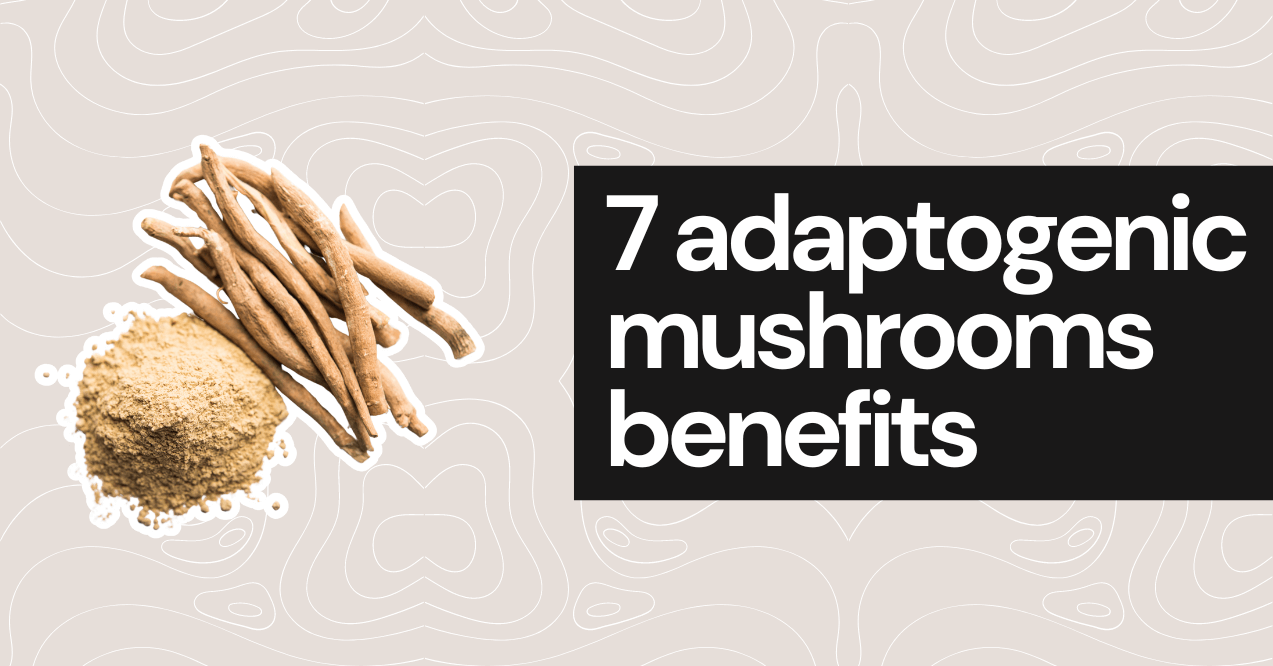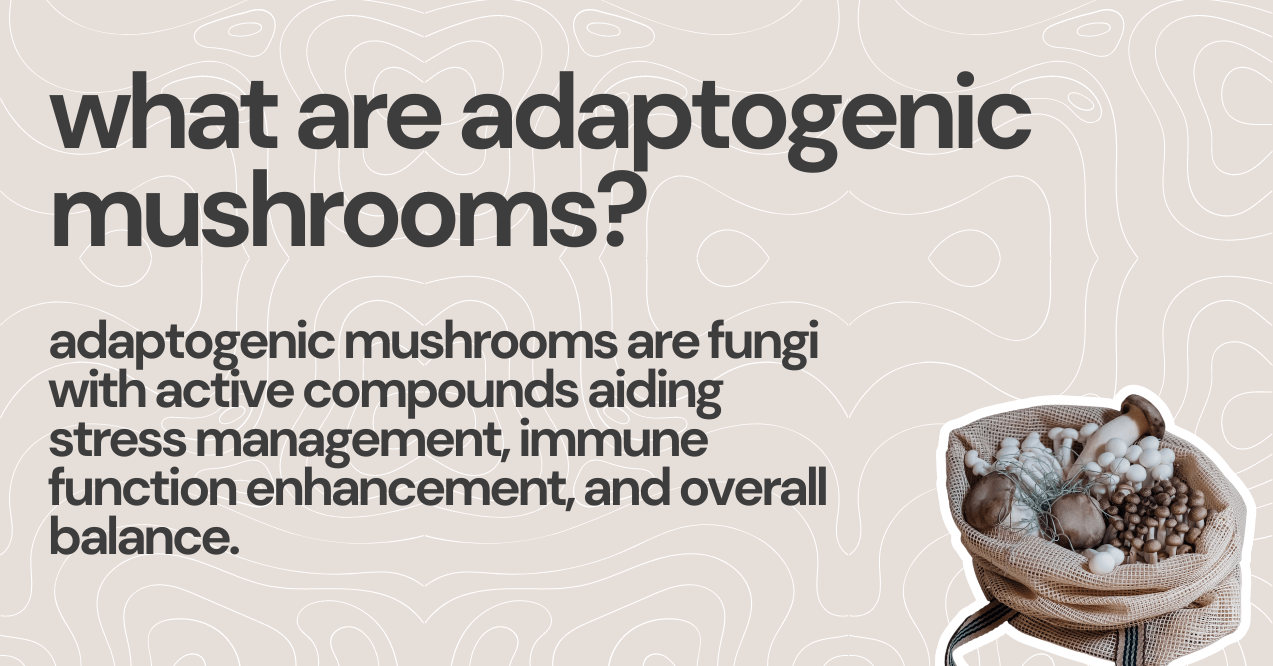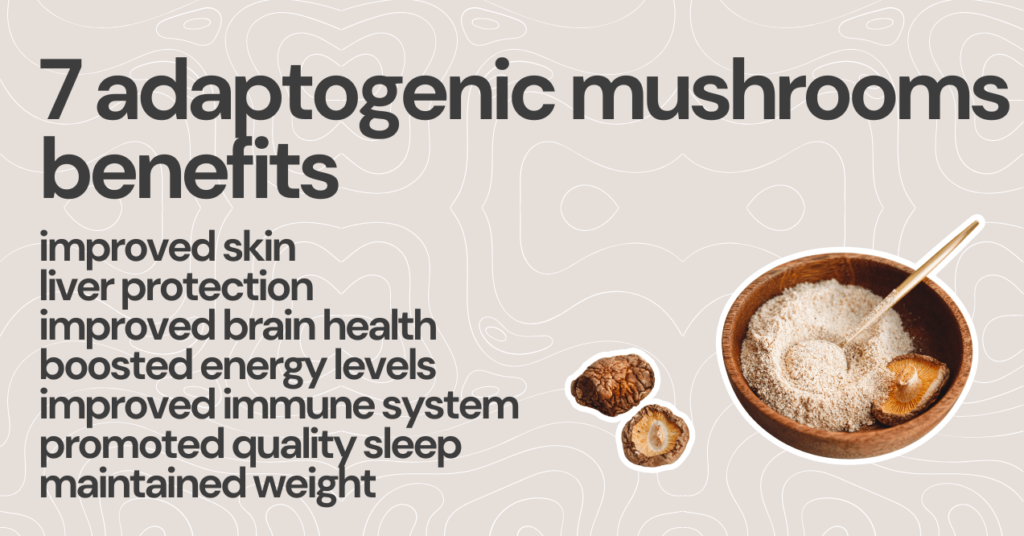health, mushrooms
by trumeta | December 15, 2023
7 Adaptogenic Mushrooms Benefits for Optimal Health

Many adaptogenic mushroom benefits for women and men exist, including increased attention, and it’s time to take a closer look at these fascinating fungi. With an ability to help us adapt to the stressors of modern life and a rich history dating back to ancient times, there’s much to discover about the potential for promoting optimal health.
Traditional Chinese medicine and Ayurveda started around 3000 BCE, and since then, they have consistently incorporated adaptogenic herbs and mushrooms. Chinese emperors sent expeditions to distant lands to find valuable herbs and mushrooms early in history. This resulted in the discovery of rhodiola in Siberia and Chinese royalty using reishi and rhodiola between 2500 and 2700 BCE.
In 1948, Soviet scientist Dr. Nikolai Lazarev coined the term ”adaptogen“[1] while studying the body’s resistance to stress. This sparked renewed interest in adaptogens, leading to numerous clinical studies that have revealed the potential of adaptogenic plants like chaga, rhodiola, and reishi to promote optimal health.
Adaptogens, treasured for their ability to help the body adjust to various stressors, have long held a special place in natural health and wellness. Whether you’re new or familiar with them, now is the perfect time to explore their benefits and expand your knowledge, especially considering their status as one of the best supplements for cell regeneration.
What Are Adaptogenic Mushrooms?

Adaptogenic mushrooms are fungi with active compounds aiding stress management, immune function enhancement, and overall balance. Termed “adaptogens,”[2] they assist the body in acclimating to physical, environmental, or emotional challenges.
Some of the common adaptogenic mushrooms include the following:
- Reishi (Ganoderma lucidum): Often called the “Mushroom of Immortality,” reishi supports immunity and longevity. It combats stress, supports liver and heart health, and promotes a sense of calmness.
- Cordyceps (Cordyceps militaris): Cordyceps has the potential to boost energy levels, enhance respiratory function, and improve athletic performance. They help fight fatigue, exhaustion, and weakened immune systems.
- Lion’s Mane (Hericium erinaceus): The lion’s mane mushroom is well-known for its cognitive support and neuroprotective properties. It enhances learning and memory and furthers nerve cell regeneration and myelination.
- Chaga (Inonotus obliquus): Chaga mushrooms provide antioxidants and nutrients that support the immune system, liver function, and overall cellular health.
- Turkey Tail (Trametes versicolor): Turkey tail mushrooms have immune-boosting properties. Research has extensively explored their role in supporting cancer treatment by aiding the immune system and promoting gut health.
Therefore, their properties help to achieve the following purpose:
- Increase resistance to stress by modulating hormone release, controlling it from getting to extreme levels.
- Possess immunomodulatory qualities that balance the immune system’s function. They activate the immune system to ward off infections and pathogens and reduce its activity when overactive, limiting inflammation and autoimmune reactions.
- Contributes to body homeostasis[3]. They support wellness by achieving an equilibrium among various physiological systems like the endocrine, immune, and nervous systems.
7 Adaptogenic Mushrooms Benefits

Adaptogenic mushrooms’ benefits are truly transformative for our health. Their potent properties provide us with a spectrum of advantages, contributing positively to our overall well-being, as outlined below.
1. Improving Skin
Research shows adaptogenic mushrooms like reishi, chaga, and cordyceps may benefit skin health. Compounds such as polysaccharides, antioxidants, and anti-inflammatory agents are widely known to enhance skin health.
The health benefits of adaptogenic mushrooms include potentially supporting skin hydration by increasing natural hyaluronic acid production – the key component responsible for retaining water in the skin. This process may result in a more youthful and supple appearance.
These mushrooms’ high antioxidant levels[4] may combat free radicals responsible for oxidative stress, a significant contributor to skin aging. By protecting the skin from oxidative damage, adaptogenic mushrooms might reduce the appearance of fine lines, wrinkles, and age spots.
With their anti-inflammatory properties, adaptogenic mushrooms may also alleviate skin inflammation and redness. Research shows that regularly consuming these mushrooms could improve skin conditions.
2. Protecting the Liver
Adaptogenic mushrooms (reishi, cordyceps, and turkey tail) enrich liver health. Hepatoprotective effects[5] come from their compounds, such as triterpenoids, beta-glucans, and polysaccharides.
These mushrooms display vigorous antioxidant activity[6] and may potentially protect liver cells from oxidative stress and inflammation from toxins, viruses, or alcohol. They may neutralize free radicals, control liver cell damage, and promote liver health.
Adaptogenic mushrooms may also foster liver detoxification. Their compounds, like triterpenoids, increase enzyme activity that removes toxins from the body. They might enhance the body’s natural detoxification process, ensuring optimal liver function.
3. Supporting Brain Health
Lion’s mane and reishi may also support brain health. They contain bioactive compounds like hericenones, erinacines[7], and triterpenes, affecting cognitive functions.
Lion’s mane mushrooms might stimulate nerve growth factor (NGF) and brain-derived neurotrophic factor (BDNF) production, maintaining neuron health. According to study, they promote cognitive health[8], improve memory, and enhance learning.
Reishi mushrooms have neuroprotective properties due to triterpenes. They fight against neurodegenerative disorders by reducing oxidative stress and inflammation – the leading causes of neuron damage.
4. Boosting Natural Healthy Energy Levels
Cordyceps and chaga are known to enhance energy levels due to compounds like polysaccharides, β-glucans, and cordycepin. Cordyceps increase the production of adenosine triphosphate[9] (ATP), a molecule that provides energy to muscles.
It may improve oxygen usage, especially during exercise, boosting energy levels. Chaga mushrooms, with high polysaccharides and β-glucans content, raise energy levels by regulating the immune system and enhancing metabolic health.
5. Improving the Immune System
Reishi, chaga, and cordyceps contain bioactive compounds that may support and modulate the immune system. Polysaccharide glucans in reishi could potentially stimulate immune cell production, including natural killer cells, lymphocytes, and macrophages. These cells eliminate harmful elements, boosting the body’s disease and infection resistance.
Triterpenoids and sterols in chaga and cordyceps have anti-inflammatory properties. They inhibit the production of pro-inflammatory cytokines, potentially reducing inflammation and promoting effective immune system function.
Adaptogenic mushrooms are also said to possess immunomodulatory functions. In essence, they could both stimulate an underactive immune system and repress an overactive one. This ensures a balanced immune response, helping the body to deal more adequately with stress – a known disruptor of immune function.
Found this interesting? Make sure to learn more about the best mushrooms for health.
6. Maintaining Weight
Adaptogenic mushrooms, like reishi and maitake, may affect weight maintenance and metabolism due to their polysaccharides and β-glucans content. Maitake may inhibit fat accumulation[10] and enhance weight loss. A study showed that rats receiving maitake extract had reduced weight gains, even with a high-fat diet.
Reishi mushrooms could potentially aid weight loss by regulating gut microbiota and promoting fat metabolism. They may control genes involved in fat deposition and lipid metabolism, thus reducing body weight and visceral fat mass while improving gut microbiota dysbiosis induced by a high-fat diet.
7. Promoting Quality Sleep
Scientific research has proven that adaptogenic mushrooms directly enhance your sleep quality, thereby playing a vital role in fostering optimal health. The reishi mushroom, a species of adaptogenic mushrooms, is highly regarded for its sleep-enhancing properties.
Reishi mushroom extract may potentially boost both sleep time and efficiency by affecting non-REM sleep. Quality sleep, an essential requirement for several bodily functions like cognitive processing, metabolism, and immune response, is evidence of how using adaptogenic mushrooms can foster overall health improvements.
Moreover, the reishi mushroom is rich in triterpenes — compounds known for their sedative effects. One study in animals, depicts that these triterpenes, particularly ganoderic acid[11], intensify the release of neurotransmitters that foster sleep and relaxation, such as GABA.
By heightening GABA levels, they keep stress and anxiety at bay while promoting restful, recuperative sleep. This sleep, essential for varied physiological functions like tissue repair and growth, demonstrates another avenue in which adaptogenic mushrooms positively impact health.
Are Adaptogenic Mushrooms Safe?
Adaptogenic mushrooms are generally safe, backed by centuries of traditional use and modern scientific research. However, individual differences such as age, health, and genetics can affect reactions to these fungi.
Despite their general safety, potential risks or side effects exist. Understanding these is important before incorporating adaptogenic mushrooms into daily routines, particularly for those pregnant, breastfeeding, with pre-existing conditions, or on medication.
Potential Risks
These risks may include allergic reactions, drug interactions, and contamination, potentially causing minor inconveniences or even severe health hazards.
- Allergic Reactions: Though rare, allergic reactions to adaptogenic mushrooms can range from mild to severe, causing symptoms from itchiness and congestion to difficulty breathing and anaphylaxis. Regardless of prior successful use, allergies can occur at any time. Therefore, monitoring your body’s reaction with each dose is crucial. Start small and increase gradually as your body acclimates.
- Drug Interactions: Adaptogenic mushrooms may interact with certain medications, potentially enhancing, diminishing, or causing adverse effects. For example, they may affect the efficiency of drugs prescribed for endocrine, nutritional, or metabolic diseases.
- Contamination: Adaptogenic mushrooms, like any food or supplement, can risk impurity and contamination due to harvesting conditions, storage, and manufacturing processes. Contamination may come from bacteria, heavy metals, or harmful substances, especially since some mushrooms are wild-sourced. To minimize these risks, purchase from reliable sources and brands that conduct strict contamination testing. Proper storage is also vital to mitigate degradation or contamination.
Possible Side Effects
Some individuals may experience side effects from adaptogenic mushrooms. It’s crucial to understand these potential effects, listen to your body, and adjust your consumption habits accordingly. This way, you can maximize the benefits and minimize any adverse reactions.
- Digestive Upset: Some people experience digestive upset due to adaptogenic mushrooms, primarily because they contain complex sugars called polysaccharides, which can be difficult for some to digest. Symptoms such as gas, bloating, and diarrhea can occur. To minimize these effects, start with a small dose and gradually increase it as your body adjusts.
- Dry Mouth and Throat: Taking adaptogenic mushroom supplements may cause some people to experience dry mouth and throat due to their potential mild diuretic effects, which lead to increased fluid excretion. While not typically severe, this side effect can be bothersome. Maintaining adequate hydration can help manage this symptom.
- Impact on Sleep: Cordyceps and reishi, specific adaptogenic mushrooms, can potentially affect sleep patterns. Reishi often promotes relaxation and better sleep, but taking it too close to bedtime might keep some people awake. On the other hand, cordyceps boosts energy levels and could disrupt sleep if consumed late in the day. Consequently, timely consumption plays a crucial role in minimizing sleep disturbances.
How Often Should You Consume Adaptogenic Mushrooms?
Adaptogenic mushrooms can be added to your regular diet. However, the appropriate frequency and dosage might vary based on the type of mushroom and individual health conditions.
One should typically consume adaptogenic herbs in small doses daily, continuing over the course of 6 to 12 weeks unless directed otherwise.
Ingesting large amounts in a single sitting could lead to potential side effects, which might include:
- Nausea
- Vomiting
- Dizziness
- Headaches
Since each mushroom variety has different levels of adaptogens, there’s no official recommendation for a specific daily dosage. However, general observations suggest that consuming less than 500 mg of mushrooms daily causes little to no side effects.
Final Takeaways
Adaptogenic mushrooms, with their centuries-long history, hold an unfading significance owing to their potential therapeutic abilities. In recent years, they have transitioned from being a mere culinary delight to a sought-after health supplement. As adaptogens, these mushrooms serve as natural assistants, enabling the body to withstand different kinds of stress by combating:
- Physical stressors
- Physiological stressors
- Biological stressors
What differentiates adaptogenic mushrooms is their profound health impact. Their antioxidant-rich properties contribute to enhancing skin health. Varieties like reishi are popular for their liver-protective benefits. They have the potential to foster brain health by improving cognition and memory. Together with aiding energy and stamina, their unique compounds also strengthen the immune system.
Though generally safe to consume, the dosage of adaptogenic mushrooms depends on various factors, including the type of mushroom and the individual’s overall health. The frequency of consumption relies on individual health needs and tolerance. Nevertheless, regular usage is often recommended to derive the best possible benefits.
FAQs
There are several key benefits to including adaptogenic mushrooms in your diet:
Improved Skin: The antioxidants present in these mushrooms can reduce oxidative stress, promoting healthier skin.
Liver Protection: Mushroom varieties such as reishi contain properties that could shield the liver from damage.
Brain Health Support: Intake of adaptogenic mushrooms potentially boosts cognitive function and memory.
Natural Energy Levels Boost: These mushrooms house compounds that can enhance vitality and endurance.
Immune System Assistance: Specific compounds found in these mushrooms can contribute to elevated immune health.
You can consume adaptogenic mushrooms based on your personal preferences and requirements. A typical guideline for the majority of people is to integrate them into their daily routines, such as:
Incorporating a powdered form into your morning smoothie or coffee
Following the instructions on the package and ingesting a supplement in capsule form
Savoring a cup of adaptogenic mushroom tea
Remember to heed your body’s signals and modify your consumption as needed. If you need to take a break for a day or reduce intake, it’s perfectly fine!
When consuming adaptogenic mushrooms with their plentiful benefits, remember these important aspects:
Individual Reactions: Each individual might respond uniquely to adaptogenic mushrooms, similarly to any other supplement. Always initiate with the smallest suggested dose and monitor your reactions.
Allergies: If you suffer from mushroom allergies, refrain from using adaptogenic ones to mitigate any adverse allergic responses.
Interactions: Special note that adaptogenic mushrooms might interact with other supplements or medications you’re taking. Hence, consultation with a knowledgeable person in supplements before starting any new regimen is advisable.
Quality: Ensure you get your adaptogenic mushrooms from a trustworthy source. Substandard products might contain contaminants or provide fewer benefits.
References:
[1] Romm, A., Burgess, I., Winston, D., Zick, S. M., & Crawford, A. M. (2010). Conditions of the reproductive organs. In Elsevier eBooks (pp. 211–255). https://doi.org/10.1016/b978-0-443-07277-2.00009-x
[2] Cleveland Clinic. (2022). Adaptogens. https://my.clevelandclinic.org/health/drugs/22361-adaptogens
[3] Cui XY, Cui SY, Zhang J, Wang ZJ, Yu B, Sheng ZF, et al. Extract of Ganoderma lucidum prolongs sleep time in rats. J Ethnopharmacol. 2012 Feb 15;139(3):796-800. doi: 10.1016/j.jep.2011.12.020. https://pubmed.ncbi.nlm.nih.gov/22207209/
[4] Du, X., Mu, H., Zhou, S., Zhang, Y., & Zhu, X. (2013). Chemical analysis and antioxidant activity of polysaccharides extracted from Inonotus obliquus sclerotia. International Journal of Biological Macromolecules, 62, 691-696. https://pubmed.ncbi.nlm.nih.gov/24145301/
[5] Ko, K. M., & Leung, H. Y. (2007). Enhancement of ATP generation capacity, antioxidant activity and immunomodulatory activities by Chinese Yang and Yin tonifying herbs. Chinese Medicine, 2(3). https://www.ncbi.nlm.nih.gov/pmc/articles/PMC1847515/
[6] Li, I. C., Lee, L. Y., Tzeng, T. T., Chen, W. P., Chen, Y. P., Shiao, Y. J., & Chen, C. C. (2018). Neurohealth Properties of Hericium erinaceus Mycelia Enriched with Erinacines. https://pubmed.ncbi.nlm.nih.gov/29951133/
[7] Libretti, S., & Puckett, Y. (2023). Physiology, Homeostasis. In StatPearls. Treasure Island (FL): StatPearls Publishing.https://www.ncbi.nlm.nih.gov/books/NBK559138/
[8] Lull, C., Wichers, H. J., & Savelkoul, H. F. J. (2005). Antiinflammatory and Immunomodulating Properties of Fungal Metabolites. Mediators of Inflammation, 2005(2), 63-80. https://www.ncbi.nlm.nih.gov/pmc/articles/PMC1160565/
[9] Maiese, K., Li, F., & Chong, Z. Z. (2014). New avenues of exploration for erythropoietin. JAMA, 312(21), 2225-2226. doi: 10.1001/jama.2014.2263. Retrieved from https://www.ncbi.nlm.nih.gov/pmc/articles/PMC4209543/
[10] Madrigal-Santillán, E., Madrigal-Bujaidar, E., Álvarez-González, I., Sumaya-Martínez, M. T., Gutierrez-Salinas, J., Bautista, M., … & Morales-González, J. A. (2014). Review of natural products with hepatoprotective effects. World Journal of Gastroenterology, 20(40), 14787. https://www.ncbi.nlm.nih.gov/pmc/articles/PMC4209543/
[11] Mori, K., Inatomi, S., Ouchi, K., Azumi, Y., & Tuchida, T. (2009). Improving effects of the mushroom Yamabushitake (Hericium erinaceus) on mild cognitive impairment: a double-blind placebo-controlled clinical trial. Phytotherapy research, 23(3), 367-372. https://pubmed.ncbi.nlm.nih.gov/18844328/
Advertisement. This site offers health, wellness, fitness and nutritional information and is designed for educational purposes only. You should not rely on this information as a substitute for professional medical advice, diagnosis, or treatment. If you have any concerns or questions about your health, you should always consult with a physician or other health-care professional. Do not disregard, avoid or delay obtaining medical or health related advice from your health-care professional because of something you May have read on this site. The use of any information provided on this site is solely at your own risk.
Popular Posts
Recent Posts
Does Creatine Expire and Lose Its Effectiveness?
July 17, 2024
Should You Take Pre Workout Before Running?
July 11, 2024
What Are the Best Herbs for Muscle Recovery?
June 27, 2024
Can You Drink Protein Shakes Without Working Out?
June 20, 2024


